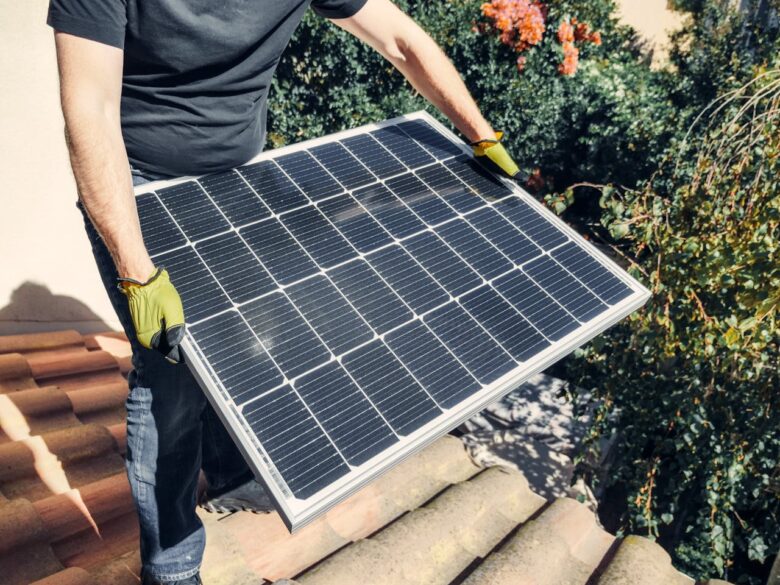Solar panels are a major advancement in green technology. They allow households to directly generate electricity from the sun. Unlike traditional power sources that heavily rely on fossil fuels, solar panels convert sunlight into clean renewable energy without emitting harmful emissions. Solar panels are a simple but powerful technology that has become the cornerstone of sustainable living. They allow individuals to reduce their dependency on polluting power systems and embrace a lifestyle that supports environmental preservation.
Why Solar Panels Matter for Sustainable Living
Solar panels are important because they can reduce the carbon footprint for households. Every time we produce electricity from coal or gas, greenhouse gases enter the atmosphere and contribute to global warming. Solar energy is plentiful, clean, and free. Solar panels can help families save money, reduce their carbon footprint, and conserve resources. Solar power is not only a practical option, but it’s also an important step towards a sustainable future.
Solar Panels: How they Work
Photovoltaic solar panels convert sunlight into electricity by capturing the sun’s energy. The cells in the solar panels absorb sunlight and produce an electrical current. This current can power home appliances, lights, and heating and cooling systems. Depending on the configuration, any extra power can be stored in batteries or returned to the local grid. Solar panels are becoming more popular because they are simple to use and effective.
Solar Panels: Environmental Benefits
Solar panels are a green technology that offers several advantages. Solar panels reduce the reliance on fossil fuels and emissions that are harmful to air quality. They also accelerate climate change. Solar energy systems use very little water in comparison to other power generation methods, helping conserve a precious natural resource. Installing solar panels ensures cleaner energy and contributes to the collective effort of preserving ecosystems, protecting wildlife, and maintaining the natural balance on our planet.
The Economic Benefits of Solar Energy
Solar panels are not only environmentally friendly, but they also provide homeowners with long-term financial benefits. Although installation can be costly initially, the long-term electricity cost savings frequently outweigh the cost. Many governments and organizations make solar panel installation more affordable by offering tax incentives, rebates, and subsidies. Solar panels require minimal maintenance and have a long lifespan. This benefit allows homeowners to continue using renewable energy while decreasing their dependence on energy costs.
Solar Panels for Everyday Living
Solar panels can be used in many areas of daily life. Solar panels can be used to power electric vehicles, lighting, heating systems, and water pumps. Solar power can now be integrated seamlessly into energy-efficient systems and appliances with the advent of smart home technologies. Solar energy users are more conscious of their energy usage, which leads to other sustainable habits like reducing waste or improving insulation. Solar panels are not only an energy solution but also part of a sustainable lifestyle.
Solar Panel Adoption: Challenges
Solar panels are a wonderful option, but they come with some challenges. Some families may find the upfront cost of installation prohibitive, despite the long-term benefits. Solar panels require a lot of space, and they must be positioned correctly to get enough sunlight. Such an arrangement may not always be possible. The weather and seasonal changes may affect the energy production. Such an arrangement makes backup systems or storage options necessary. Solar energy is becoming more accessible and affordable for more people despite these challenges.
Solar Panels and Community Benefits
Solar technology has a far-reaching impact. Solar community projects enable multiple families to benefit from solar energy even if they are unable to install panels on their roofs. These shared systems provide clean energy for entire neighborhoods and reduce collective dependence on traditional power sources. Solar energy is also being adopted by schools, businesses, and community centers, increasing awareness and accessibility. Solar technology fosters shared responsibility and contributes to the development of stronger, environmentally friendly communities.
Solar Energy: The Future of Green Tech
Solar panels have a bright future as innovations continue to increase possibilities. Solar power will play an important role in the transition to cleaner energy systems and reducing carbon dioxide emissions as global demand for renewables increases. Battery technology advances will improve reliability by making it easier to store and use solar energy at night or on cloudy days. When integrated into smart grids, solar panels will become more affordable and efficient. Solar energy’s future is one of affordability, growth, and a greater impact for both households and the planet.
Conclusion
Solar panels are one of the best and most effective green technologies. Solar panels allow households to generate clean energy and reduce their carbon footprint while saving money over time. Solar panels are a cornerstone for sustainable living, despite the challenges of upfront costs and weather dependence. The potential for positive economic and environmental impact increases as technology improves and more people adopt solar power. Solar energy is an investment in a healthier, cleaner future for future generations.
FAQs
1. What is the purpose of solar panels?
Solar panels convert sunlight into electricity for powering homes, appliances, and other systems.
2. What are the environmental benefits of solar panels?
They conserve water and natural resources, such as fossil fuels.
3. Are solar panels expensive
Initial costs can be high, but with tax incentives, rebates, and energy savings over the long term, they become affordable.
4. Can solar panels be used on cloudy days?
Solar panels can generate electricity even on cloudy or rainy days. However, the efficiency will be lower than in sunny conditions.
5. How long do solar panels last?
Solar panels are a sustainable long-term investment. They can last from 25 to 30 years with minimal maintenance.




